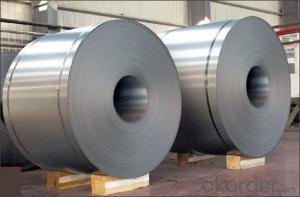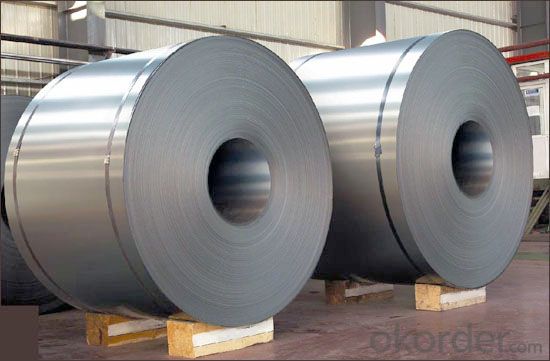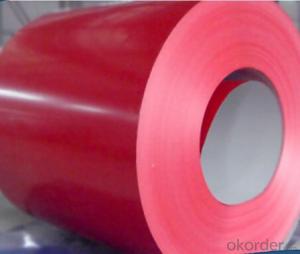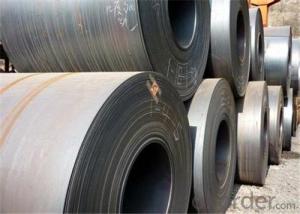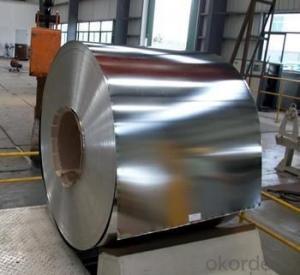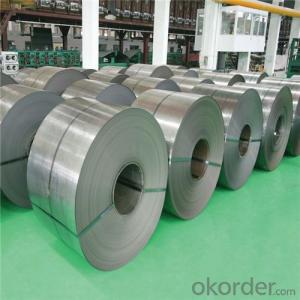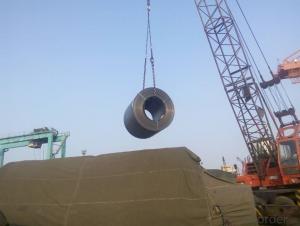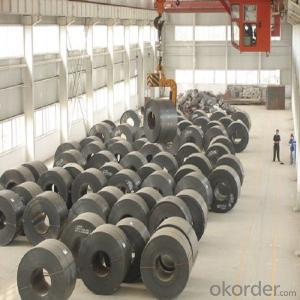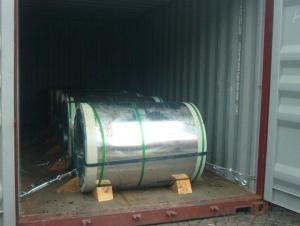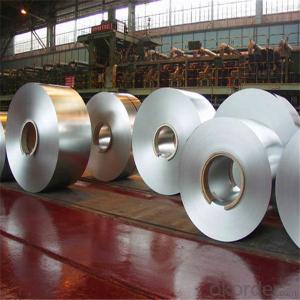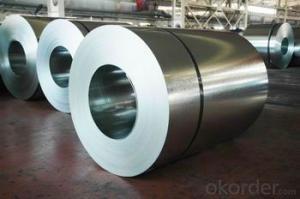COLD ROLLED STEEL COIL WITH HIGH QUALITY AND COMPETITVE PRICE NO.1
- Loading Port:
- Tianjin
- Payment Terms:
- TT OR LC
- Min Order Qty:
- 25 m.t.
- Supply Capability:
- 5000 m.t./month
OKorder Service Pledge
OKorder Financial Service
You Might Also Like
Cold rolling means that hot rolled steel coil is rolled below recrystallization temperature after pickling, and its finished product is full hard coil. After annealing process for full hard coil, the finished product is cold rolled production. The thin gauge cold rolled steel sheet and strip steel have advantages of low surface roughness, high dimension accuracy and good mechanical properties etc, and which have been widely used in auto manufacturing, home appliance, architecture, aviation, precision instrument, hardware and enameling industry etc.
Main specification:
COLD ROLLED STEEL | |
Thicknenss | 0.10mm-4.00mm |
Width | 600mm-2000mm |
Sheets length | 1200-6000mm |
Coil inner diameter | 508-610mm |
Surface treatement | matt finish/bright finish,oiling/dry, bright anneal/black anneal |
Coil weight | 3-5t |
We can supply customers' with different specifications of the highest quality and lowest price.
Cold rolled steel is the based material for galvanized steel coil and pre-painted galvanized steel coil. It is widely used in light industry for marking tank, furniture, refrigerators, washers, freezer plate, air conditioner, micro-wave oven, water heater, soot such machine etc.
With excellent cold bending molded manufacturablity, good decoration effect, strong anti-corrosion ability, galvanized steel coils and sheets are also pollution-free and easily recycled. Accordingly, they can be used as final products and basic plates of color coated steel coils.
Sincerely welcome to contact us for the future details if any item interest you ,and we will make every effort to assure that your requirements will be satisfied ,and we hope to establish long-term business relations with you on the basis of the equality and mutual benefit.
We are waiting for your feedback.
- Q: How are steel coils used in the manufacturing of shock absorbers?
- Steel coils are used in the manufacturing of shock absorbers as they provide the necessary spring force to absorb and dampen the impact from road irregularities. The coils are designed to compress and expand under pressure, allowing the shock absorber to absorb and dissipate the energy generated during vehicle movement, resulting in a smoother and more controlled ride.
- Q: who are the 7 best steel guitar players ever?
- 1. Buddy Emmons 2. Jimmy Day 3. Tom Brumley 4. Ralph Mooney 5. Shot Jackson 6. Jerry Byrd 7. Speedy West
- Q: What are the different methods of painting steel coils?
- There are several methods of painting steel coils, including coil coating, spray painting, and powder coating. Coil coating involves applying a liquid coating to the surface of the steel coil, which is then cured and dried. Spray painting involves using a spray gun to apply paint to the coil, typically in multiple layers. Powder coating involves electrostatically applying a dry powder to the coil, which is then cured and fused onto the surface. Each method has its advantages and is chosen based on factors such as durability, cost, and desired finish.
- Q: How can the outer diameter and weight of steel coil be converted?
- When it comes to this question, in fact, a lot of them are irrelevant. The weight of the steel rolls means that there is a unit weight called the weight of each mm in the width of the steel coil
- Q: What is the accuracy of steel tape inspection?
- In addition, the project is through the detection of steel tape, steel tape each batch have the error him different, so do projects each into a batch of steel tape has to go through the inspection department, let this batch of steel tape has reached the same error range. All the measuring tools in this project are unified into these steel tape measures, so that the measurement error is guaranteed
- Q: How do steel coils compare to stainless steel coils?
- Steel coils and stainless steel coils find extensive use in various industries due to their robustness and durability. Nevertheless, selecting the appropriate material necessitates considering some essential distinctions between the two. One of the primary disparities lies in the composition of the materials. Steel coils, primarily comprising iron and carbon, incorporate additional elements to enhance specific properties. Conversely, stainless steel coils contain iron, carbon, and a substantial amount of chromium, which imparts them with distinctive corrosion-resistant attributes. Owing to the presence of chromium, stainless steel coils outperform regular steel coils in their resistance to corrosion, tarnishing, and rust. This renders stainless steel coils highly suitable for applications within environments characterized by elevated humidity, moisture, or exposure to corrosive substances. On the contrary, steel coils are more susceptible to rust and may necessitate supplementary protective coatings or treatments to avert corrosion. Another notable differentiation concerns the visual appearance of the two materials. Stainless steel coils boast a lustrous and reflective surface, endowing them with an aesthetically pleasing allure. They commonly find application in contexts where appearance holds significance, such as kitchen appliances, architectural structures, or decorative purposes. Conversely, steel coils exhibit a matte or dull finish and are frequently employed in industrial applications where visual aesthetics are of secondary concern. In terms of strength, both steel and stainless steel coils exhibit excellent mechanical properties. However, stainless steel coils generally demonstrate greater tensile strength and enhanced resistance to high temperatures. Consequently, they prove well-suited for applications necessitating strength, such as the construction, automotive, or aerospace industries. Lastly, cost represents a factor warranting consideration while comparing steel coils to stainless steel coils. Steel coils generally offer a more cost-effective option due to the lower expense of raw materials and simpler manufacturing processes. Nevertheless, when factoring in the added value of corrosion resistance and longevity, stainless steel coils may emerge as a more economical choice in the long run, requiring less maintenance and replacement. To conclude, steel coils and stainless steel coils possess distinct properties and characteristics, rendering them suitable for specific applications. Stainless steel coils exhibit superior corrosion resistance, a glossy appearance, and heightened tensile strength, while steel coils prove more cost-effective. Ultimately, the selection between the two hinges on the precise requirements of the application, encompassing factors such as the environment, aesthetics, strength, and budget.
- Q: What is the difference between a steel strip and a coil? The steel strip is flat steel, and the steel coil is made of steel. Is that correct?
- Steel rolls are also called steel belts. There is no difference between them. They are not flat steel
- Q: How do steel coils contribute to the construction machinery industry?
- Steel coils are an essential component in the construction machinery industry. They play a crucial role in the manufacturing of heavy-duty machinery and equipment used in construction projects. One of the primary ways steel coils contribute to the construction machinery industry is through their use in the fabrication of structural components. These coils are often processed and shaped into beams, plates, and tubes, which form the framework of construction machinery. The strength and durability of steel make it an ideal material for these applications, as it can withstand heavy loads and harsh working conditions. Moreover, steel coils are also used in the production of various mechanical parts and components found in construction machinery. These include gears, shafts, axles, and hydraulic system components. The versatility of steel allows it to be easily machined and formed into complex shapes, enabling the creation of efficient and reliable machinery parts. In addition to its mechanical properties, steel coils also contribute to the construction machinery industry through their corrosion resistance. Construction machinery is often exposed to moisture, chemicals, and other environmental factors that can cause rust and deterioration. Steel coils with proper coatings or finishes can provide protection against corrosion, ensuring the longevity and performance of construction machinery. Furthermore, the availability and affordability of steel coils make them a preferred material for the construction machinery industry. Steel is widely produced and can be sourced from various suppliers, ensuring a steady supply chain. Its cost-effectiveness compared to other materials makes it an attractive option for manufacturers, allowing them to produce machinery at competitive prices. Overall, steel coils are vital to the construction machinery industry by providing strength, durability, corrosion resistance, and cost-effectiveness. Their use in the fabrication of structural components and mechanical parts ensures the reliability and efficiency of construction machinery, contributing to the growth and development of the industry.
- Q: I am building a steel type competative team. my team so far isempolem, skarmory , Metagross, magnezone, lucario, ferrothorn.
- If you want steelix is good as he can use fire and steel.
- Q: i want to buy an exhaust but whats the difference between satinless steel and titanium exhaust?
- Stainless steel is more corrosion resistant than steel and titanium is more corrosion resitant and lighter. However, titanium is more prone to picking up (scratches caused by normal tools creating scratches and leading to stress fractures). The Lockheed Blackbird had to have tools treated lithium grease (i could be wrong) to prevent this. I'd stick with stainless steel as i think any titanium exhaust you can buy will be a titanium composite due to its cost
Send your message to us
COLD ROLLED STEEL COIL WITH HIGH QUALITY AND COMPETITVE PRICE NO.1
- Loading Port:
- Tianjin
- Payment Terms:
- TT OR LC
- Min Order Qty:
- 25 m.t.
- Supply Capability:
- 5000 m.t./month
OKorder Service Pledge
OKorder Financial Service
Similar products
Hot products
Hot Searches
Related keywords
